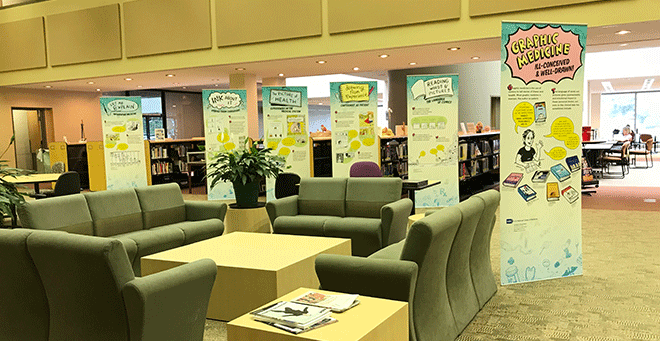For the fifth consecutive time, the National Institutes of Health’s National Library of Medicine has selected the Lamar Soutter Library to serve as a regional medical library for an area that now includes New York as well as New England. The library will receive $8.3 million to increase awareness, facilitate access and provide training on NLM programs and services to double the number of health professionals and consumers served by previous contracts.

Additionally, the library has received its second five-year contract to run the National Library of Medicine’s National Public Health Coordination Office. NPHCO gives public health departments access to reliable, evidence-based research information through the Public Health Digital Library.
Mary Piorun, PhD, is the director of library services and the director of the Network of the National Library of Medicine, New England Region. Starting May 1, when New York becomes part of the region, it will be known as Region 7.
“We’re really excited to work with the people in New York. It expands our reach and opens us up to a whole new set of partners and collaborators,” Dr. Piorun said. “It strengthens our relationship with the National Library of Medicine. NLM looks to us as an institution that can carry out the award and its mission; we have a strong working relationship where we can take on the assignments and exceed in doing them.”
The National Library of Medicine provides free resources, trainings and educational programming to promote health literacy and increase access to health equity through information. PubMed is a database popular among researchers and clinicians; MedlinePlus is targeted toward consumer groups, with reliable evidence-based information presented accessibly to a lay audience and available in a variety of languages. Piorun said during this next award cycle, the library will be focused on three new initiatives: substance use disorder, rural health and health literacy, particularly around English as a second language.
“It could be partnering to provide educational programming and bringing in speakers who are relevant to the topic and to the community that works in that area; it could be providing funding for a project,” Piorun said.
Two existing initiatives, an emphasis on educational programming for hospital librarians and graphic medicine, will continue into the new contact. Jessica Kilham, interim associate director of the Network of the National Library of Medicine, New England Region, said she came to UMass Medical School three years ago because of the work with graphic medicine, the use of comics to tell personal stories of illness and health.
“You’re able to dive deeper into a subject and make it more attainable, but still present the relevant information,” Kilham said. “We’ve had a graphic medicine symposium and we’ve funded projects with graphic medicine, taking on pretty complex subject matters such as substance use, HIV/AIDS and PTSD.”
Javier Crespo, MLIS, MPA, executive manager of the National Public Health Coordination Office, said in the new contract NPHCO is charged with reaching the public health workforce more broadly. NPHCO will work in collaboration with the Network of the National Library of Medicine to conduct information needs assessments, develop curricula for information retrieval instruction, and engage with public health organizations and associations all over the country. The collaborative engagement with the public health workforce is in addition to NPHCO’s management of the Public Health Digital Library service.
Representatives from health departments in Arizona, New Hampshire and Washington, D.C., all wrote letters of support for the National Public Health Coordination Office renewal.
The chief of the Bureau of Public Health Statistics in Arizona wrote that the materials available through the Public Health Digital Library helped medical directors in the Arizona Department of Health Services develop evidence-based recommendations and guidance for testing, diagnosis and clinical care related to COVID-19. In 2019, Arizona used library information to create an updated curriculum for medical education regarding the diagnosis and treatment of opioid use disorder. The journals that are available through the library helped New Hampshire develop drinking water standards in 2019.
Related stories on UMassMed News:
Mary Piorun named director of Lamar Soutter Library
Lamar Soutter Library renewed as NIH regional medical library